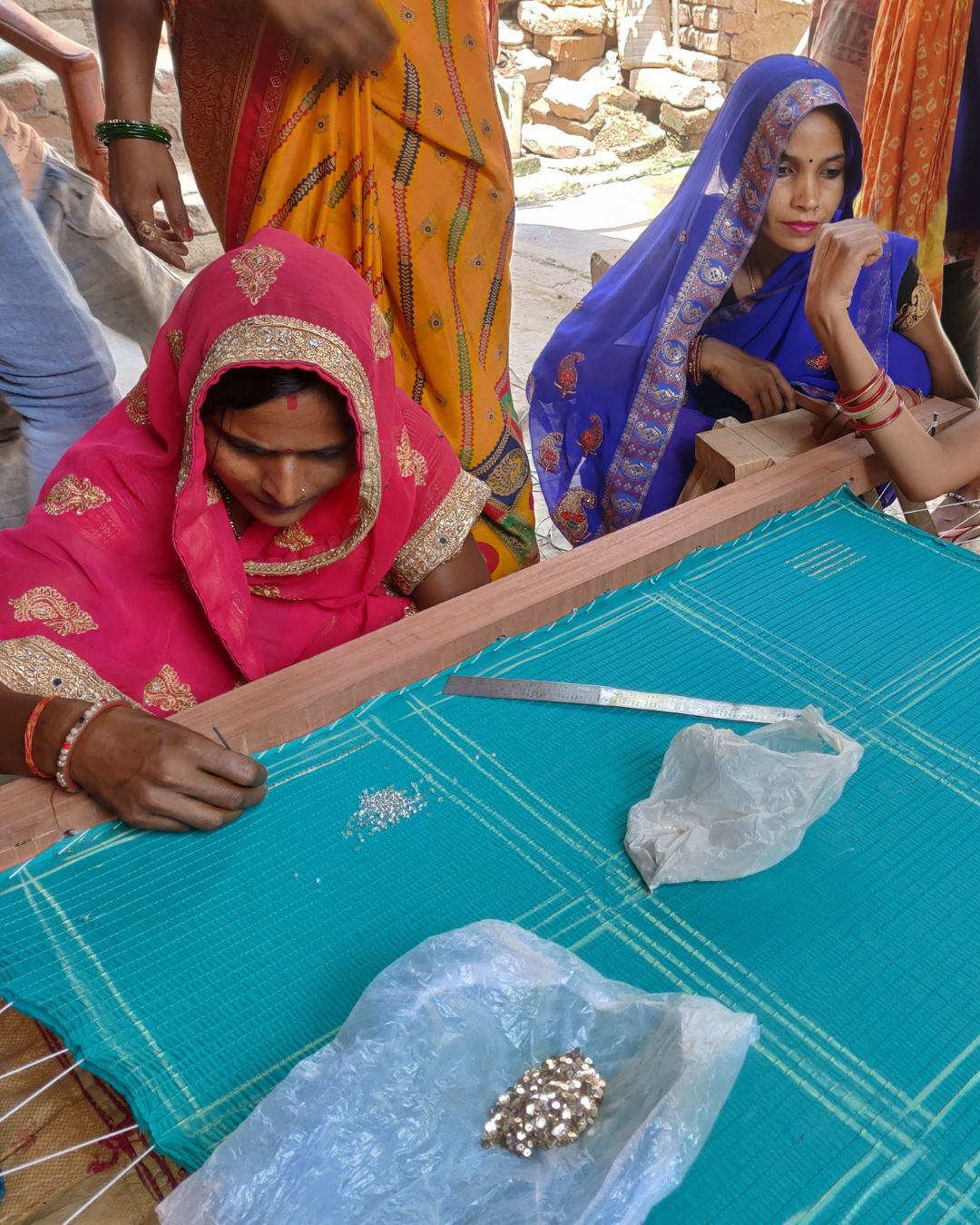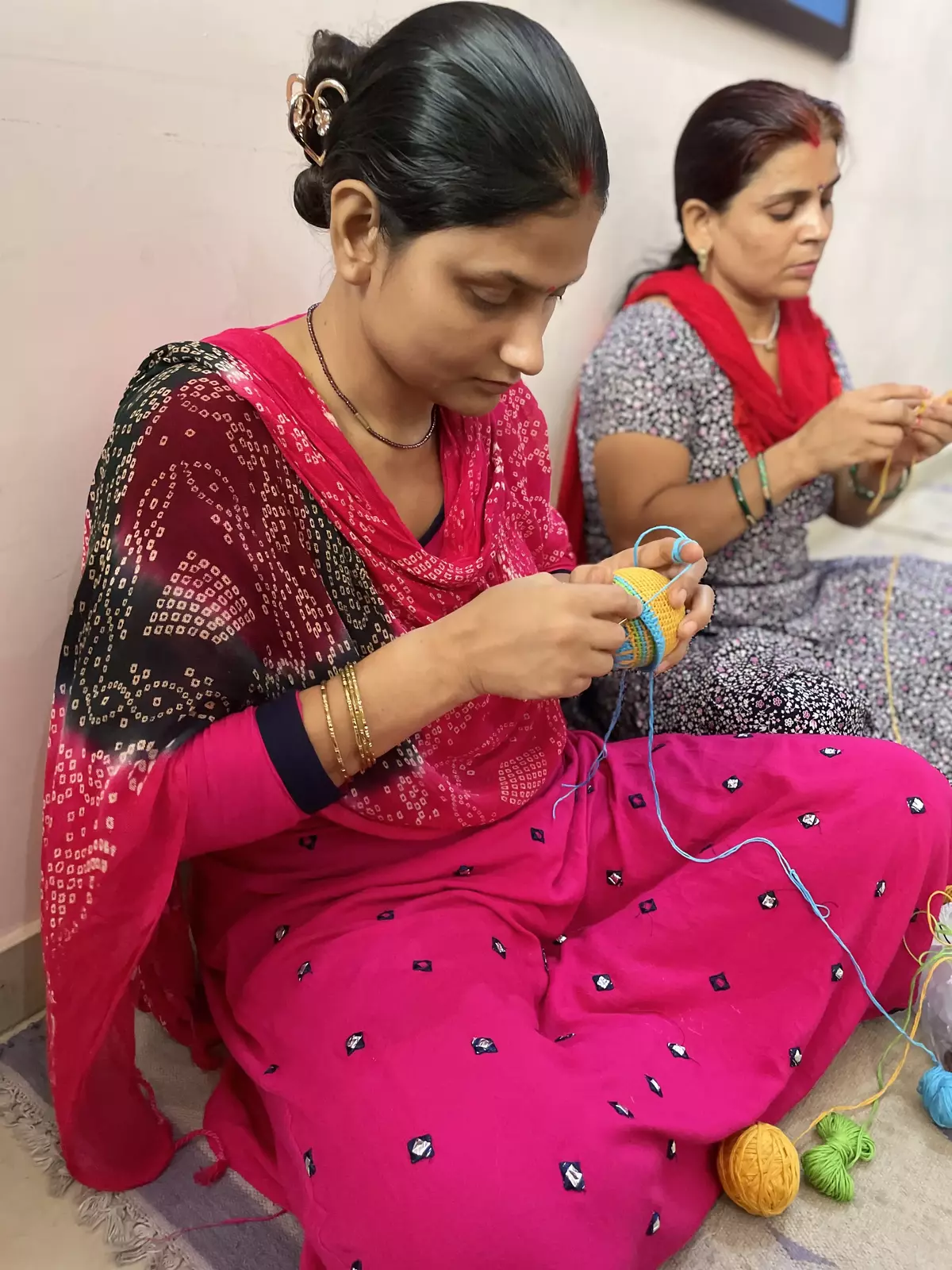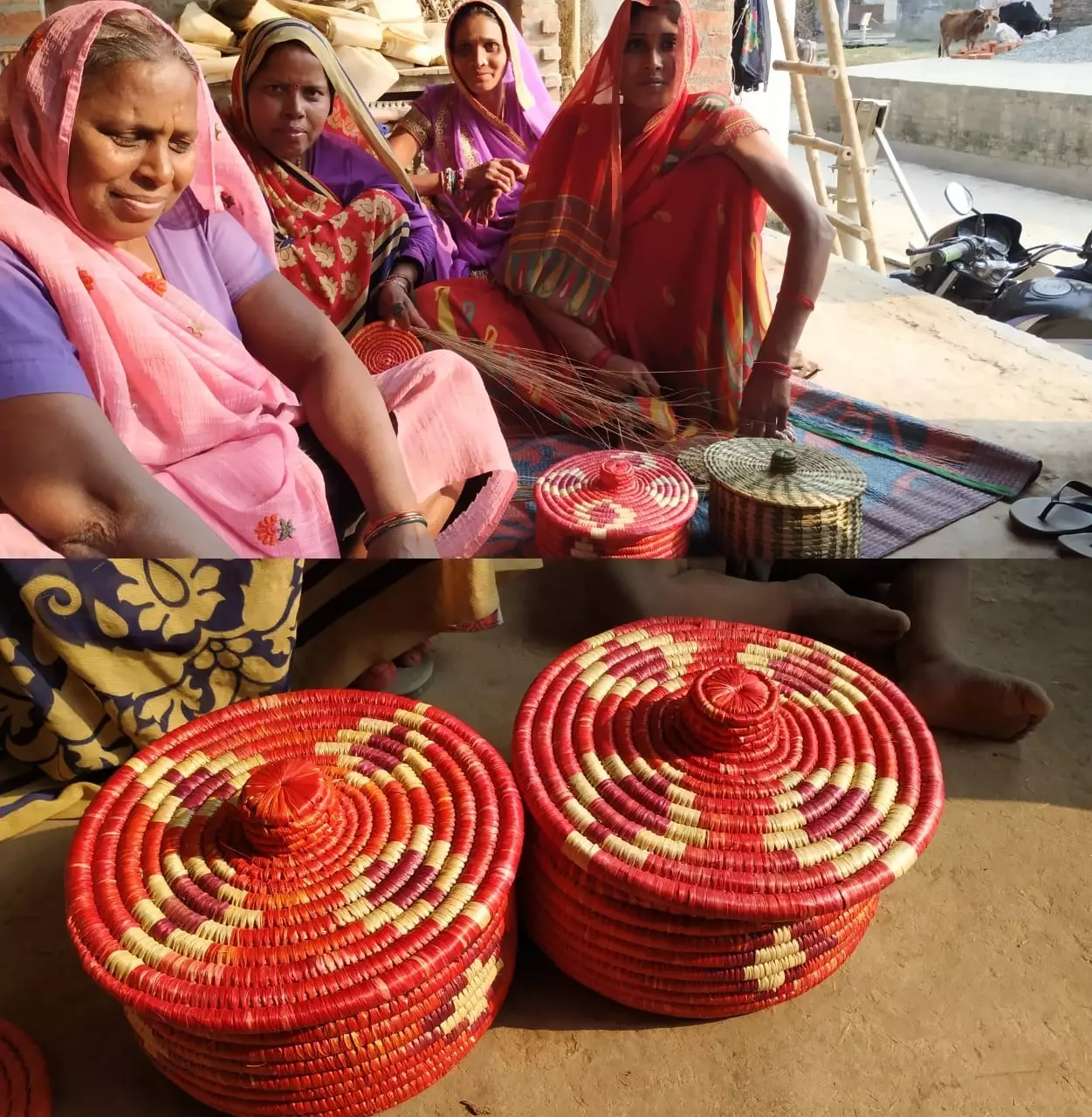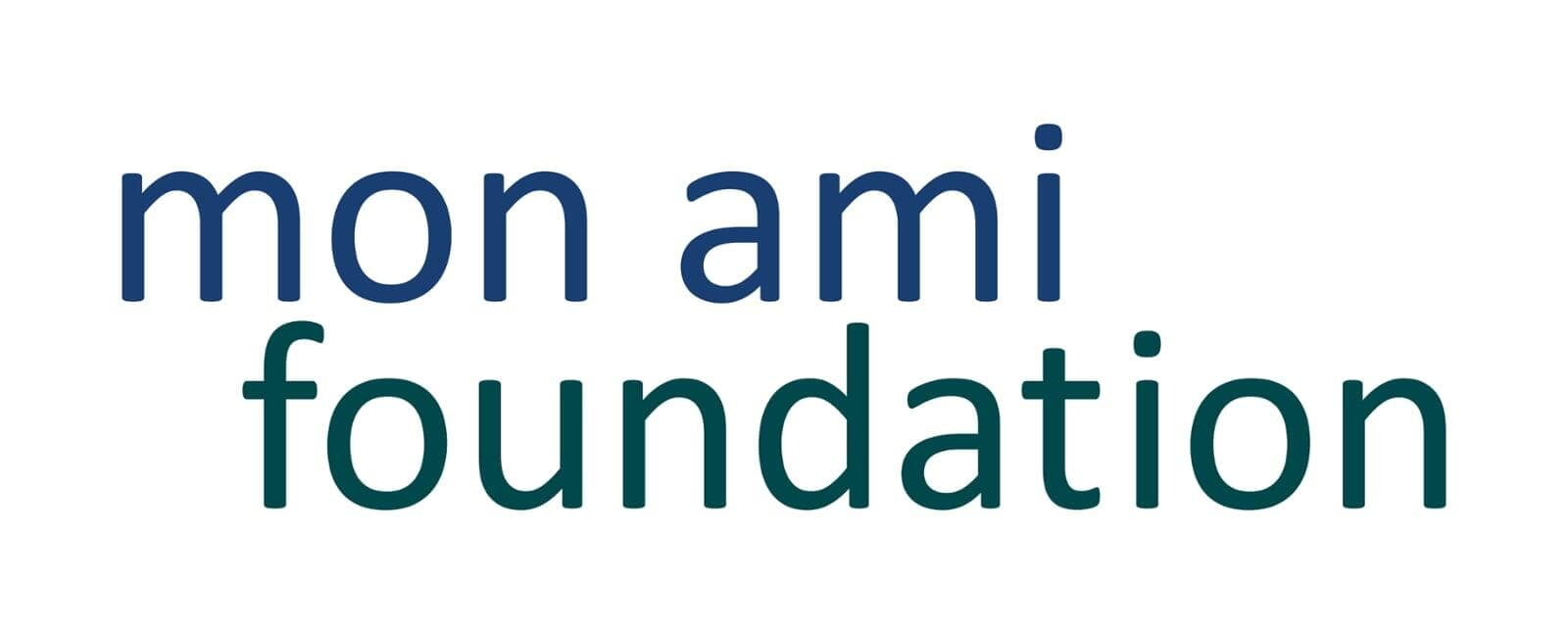Loni, Uttar Pradesh
Loni, Uttar Pradesh
100
Artisans
400
Families Supported
Rs16lac
Economic Impact
Loni, Uttar Pradesh
Loni, Uttar Pradesh
100
Artisans
400
Families Supported
Rs16lac
Economic Impact
Women Artisans:
Women Artisans:
Skills and Livelihood Project
Location:
Location:
Loni, District Hardoi, U.P
CSR Initiative by:
CSR Initiative by:
DCM Shriram Foundation

Loni, District Hardoi, Uttar Pradesh - Zardozi Project
Loni, District Hardoi, Uttar Pradesh - Zardozi Project
Project Zardozi is a program that was designed with the main purpose to create livelihood opportunities for women. It is being run as a part of the CSR initiative of DCM Shriram Foundation, where young rural entrepreneurs are being trained in the art of zardozi and other embroideries at the Silai School in Loni and Ajbapur.
Taking this forward, a group of around 50 women artisans from Loni, Hardoi were motivated towards working on a special festive collection under the guidance of master artisans from Mon Ami Foundation.
This spirited collection is a first from these artisans and is inspired by the Sarus Crane, which is a beautiful but endangered bird from the nearby Sandi Bird Sanctury. It is the world’s tallest flying bird and has both historical and spiritual significance, dating back to the legendry days of the Ramayana and Gautam Buddha.
The collection is a beautiful amalgamation of zardozi embroidery with crochet and other art forms, bringing to life some very exquisite and elegant products like coasters, tea-light holders, table runners etc that is bound to add a lot of shimmer and glamor to the festive spirit.
Impact
- Even though Project Zardozi is an ongoing livelihood sustenance program as a part of the CSR initiative by DCM Sriram Foundation, under this particular initiative, Mon Ami Foundation alongwith the support provided by DCM Sriram Foundation, were able to work with 50+ women artisans from Loni, Hardoi, guiding and helping them to work towards developing an entire collection that drew its inspiration from the Sarus Crane, an endangered bird from Sandi Bird Sanctury.
- The highly skilled women artisans, through this initiative, cultivated further talent towards working on an entire range of products, learning the intricacies of curating a beautiful collection that is at par with the international standards.
- The master artisans from Mon Ami Foundation were able to mentor them in modern designs, uplifting their skills to match the requirements of the urban sector. They worked on creating an excting fusion using zardozi embroidery, crochet and other art forms to bring together a collection that was fresh, elegant and extremely well crafted.
NCR, Delhi
NCR, Delhi
500
Artisans
2000
Families Supported
Rs 480lac
Economic Impact
NCR, Delhi
NCR, Delhi
350
Artisans
1400
Families Supported
Rs230lac
Economic Impact

NCR, Delhi -Crochet Project
NCR, Delhi -Crochet Project
Nearly one-third of India’s population are the migrant inhabitants that have drifted from rural areas to cities in search for work and improved socio-economic conditions. More than half of these migrant workers are illiterate and have not even completed their primary education because of which they are unfortunately exposed to exploitation leaving them with less than expected income to provide for their families. As the main reason behind their migration is the hope for a better livelihood, women migrants who constitute an overwhelming majority need to step-in and are expected to contribute towards the family income.
Women play a crucial role in the growth of any economy and hence it is essential to promote their skill development to provide high productivity, increased opportunities, and higher income. With inherent dexterity, aesthetic acumen and innate skills the migrant women are able to pick up the art of weaving and crafting with minimal effort and with proper training received from master artisans. For centuries, India has remained the hub for weaving and handicrafts, with techniques and proficiencies handed down from one generation to another. Crochet is one such art form that has transcended all boundaries and become popular across the country ever since its introduction to India in the early 20th century. Women in India took to crocheting with ease, possibly on account of their inherent predisposition to the craft.
Mon Ami Foundation along with HCL Foundation is committed to helping these women migrants earn a sustainable livelihood through crochet skill building initiatives. The team at Mon Ami Foundation introduced crochet to 250+ women migrant workers through a 75-day Skill Enhancement Program. For the first 30 days, they were taught the essential skills of the crochet craft technique after which they received advanced training for the next 30 days that included teaching them complex design and production processes. In the remaining 15 days, the women were trained in self-help groups, computer know-how, yoga sessions for their mental and physical wellbeing and finally advising them on the financial front that included opening bank accounts and informative sessions on investment and spending.
Impact
- The migrant women who were a part of this project not only picked up the basic crochet skills, but with the help of advanced training under the master craftsmen, they learned new and modern designs that helped them in creating products apt even for the international market.
- They learned the skills and techniques to ensure an expectable production capacity even while working from home which indirectly helped their work become more dependable especially when their market audience was being directed globally.
- At the end of their training period, the migrant women were able to create more than 900 items that included pet products, home furnishing products, toys for infants etc. All these products were clubbed under one main unit i.e Craft Hub and for their market outreach, their work was not only in demand locally because of the various online and offline platforms where they were showcased but they were also able to fetch international buyers.
- The training period helped the migrant women achieve a 360-degree growth as it helped boost their confidence, achieve a sense of community especially when they were displaced from their native villages, focus on their mental and physical wellbeing through the yoga sessions that formed a part of the training and also achieve financial independence through their newly learned skills.
- With little girls often accompanying their mothers for the training sessions, they too picked up these skills which ultimately might help pave their career paths and offer them a sense of continuity.
- The migrant women who were a part of this project not only picked up the basic crochet skills, but with the help of advanced training under the master craftsmen, they learned new and modern designs that helped them in creating products apt even for the international market.
- They learned the skills and techniques to ensure an expectable production capacity even while working from home which indirectly helped their work become more dependable especially when their market audience was being directed globally.
- At the end of their training period, the migrant women were able to create more than 900 items that included pet products, home furnishing products, toys for infants etc. All these products were clubbed under one main unit i.e Craft Hub and for their market outreach, their work was not only in demand locally because of the various online and offline platforms where they were showcased but they were also able to fetch international buyers.
- The training period helped the migrant women achieve a 360-degree growth as it helped boost their confidence, achieve a sense of community especially when they were displaced from their native villages, focus on their mental and physical wellbeing through the yoga sessions that formed a part of the training and also achieve financial independence through their newly learned skills.
- With little girls often accompanying their mothers for the training sessions, they too picked up these skills which ultimately might help pave their career paths and offer them a sense of continuity.
Sitapur, Uttar Pradesh
Sitapur, Uttar Pradesh
250
Artisans
1000
Families Supported
Rs130lac
Economic Impact
Sitapur, Uttar Pradesh
Sitapur, Uttar Pradesh
250
Artisans
1000
Families Supported
Rs130lac
Economic Impact
Women Artisans:
Women Artisans:
Skills and Livelihood Project
Location:
Location:
Sitapur, U.P
CSR Initiative by:
CSR Initiative by:
Dalmia Bharat Foundation

Sitapur, Uttar Pradesh - Moonj Project
Sitapur, Uttar Pradesh - Moonj Project
The Sarayan Collection by Mon Ami Foundation is a remarkable showcase of artisan resilience and creative transformation, made possible through CSR funding from Dalmia Bharat Foundation (DBF). This initiative empowers women artisans across India by providing vocational training, design mentorship, and dignified livelihood opportunities—anchored in cultural heritage and fuelled by purpose-driven innovation.
Thanks to DBF’s committed support, the program uplifted rural communities through Moonj basketry in Sitapur. More than 1,250 artisans and 4,700 families benefited, generating over ₹800 lakhs in direct and indirect income. These numbers reflect more than economic progress—they embody self-worth, independence, and shared pride.
Stories like Sarita Devi’s, who evolved from a novice to a skilled crochet artisan and is now educating her children, exemplify how corporate social responsibility can catalyse real change. Artisans worked from home, participated in product development, and contributed to collections that now reach global audiences.
The Sarayan Collection is not just about craft—it’s a legacy of empowerment built on the bedrock of meaningful collaboration. Mon Ami Foundation and Dalmia Bharat Foundation together illustrate what’s possible when purpose meets partnership
Impact
- With the help of support provided by the Dalmia Bharat Foundation, the team was able to bring together 100+ women artisans from Sitapur and introduce them to modern designs and forms that could easily match up to international standards.
- At the end of their training period, these women artisans put together an entire range of products inspired by the Sarayan river, which flows through this district and named it “The Sarayan Collection”.
- Their entire range was put up on a dedicated website www.sarayancraft.com that was made exclusively for the women artisans of Sitapur. The website not only displays all the exquisite items that they made as a part of this project, but it also speaks about their aspirations and expectations that they have related to this heritage craft that they have been practicing. To reach out far and wide, their products were also showcased in different fairs and exhibitions across different cities.
- More than 20+ products in different sizes, colours and patterns form a part of the Sarayan collection, that includes wall décor items, ethnic boxes, planter baskets, trivets and much more. Each of these exquisitely handcrafted products are ideal for upscale markets and depicts the sheer brilliance of this age-old art form, which these women artisans are extremely proud of.
